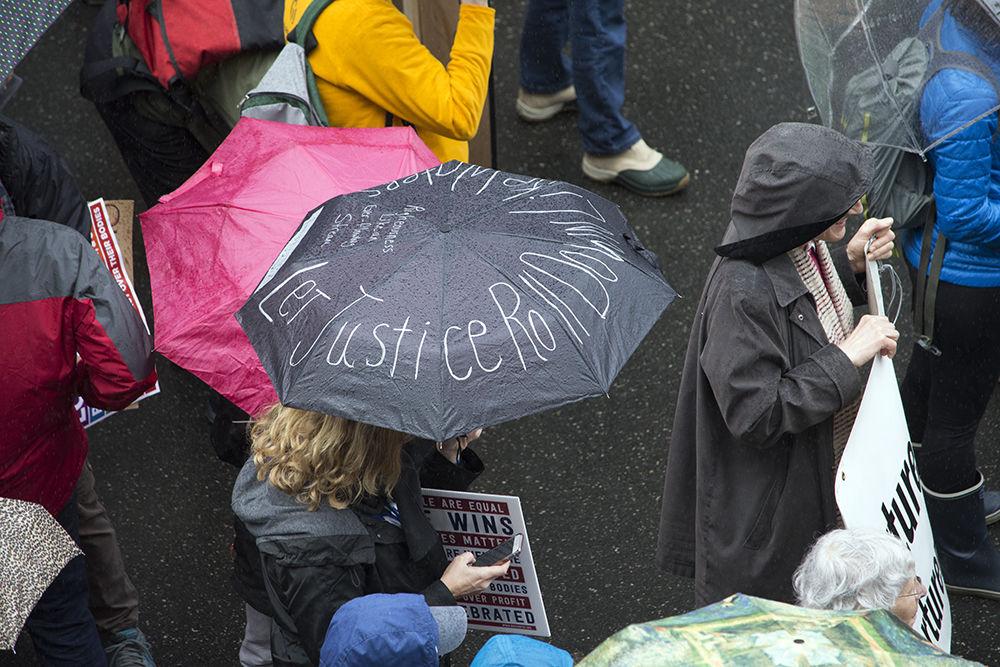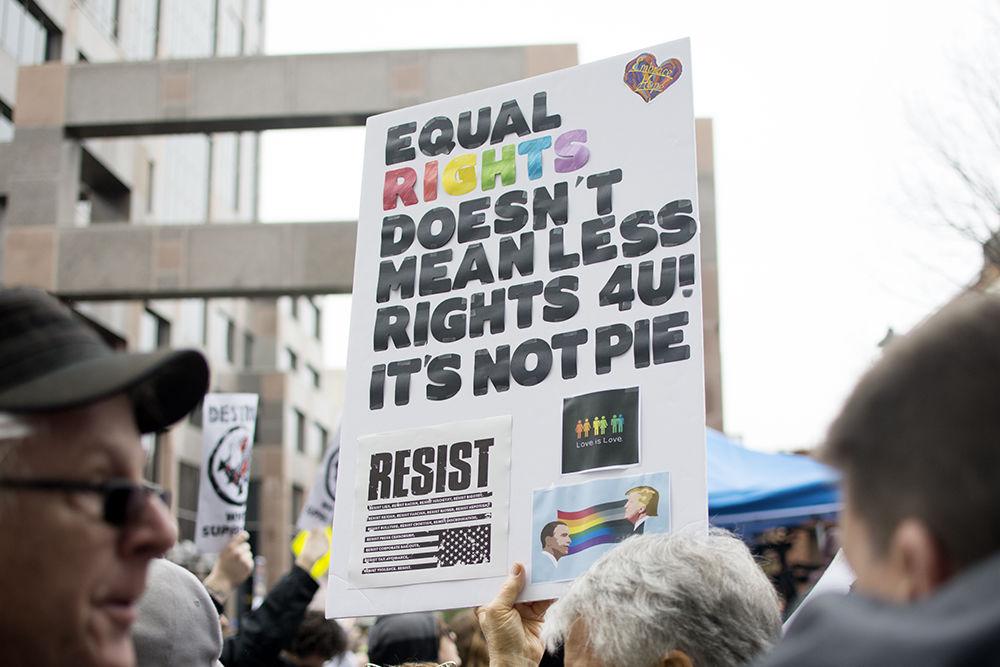Thousands of people took to the streets of downtown Raleigh Saturday to protest various aspects of the current presidential administration and to urge voters to take resistance to the ballot box this November. The Moral March aimed to raise awareness and concerns for voting rights, reproductive rights, environmental justice and rights of immigrants.
The North Carolina chapter of the National Association for the Advancement of Colored People (NAACP) organized the event and more than 20 organizations were represented in the march. These organizations, including Planned Parenthood, Black Lives Matter and Green Party activists, marched with disgruntled members of the public and shared information about their respective causes.
William Barber III, a third-year student at the UNC-Chapel Hill School of Law, is the son of former NAACP North Carolina Chapter president William Barber II. Barber III worked closely with organization of the event, and Technician had the chance to talk with him about the NAACP’s goals.
“Forward together, not one step back,” Barber III said. “What that looks like is making North Carolina more inclusive for everyone; making sure we take care of our environment, our education, our voting rights, taking care of these things that are so critical to who we are as a state and who we aspire to be as a nation.”
The march began at 10 a.m. following a series of speakers in front of the Durham Performing Arts Center. On a rainy and foggy morning, activists marched down Wilmington Street and onto Fayetteville Street, culminating in a large gathering in front of the State Capitol. The main theme of the march was “Take Resistance to the Ballot Box,” focusing on the November midterms, but viewpoints on multiple hot-button issues were represented by organizations and signs throughout the march.
“The most recent political climate that we’re seeing in this nation is the rise of divisive, dog-whistle politics, and scapegoating minority communities for the problems of this nation that have been inherent from the beginning,” Barber III said.
Wyatt Russell, a second-year studying mechanical engineering at NC State, was a speaker at the pre-march gathering. Russell is president and founder of American Justice Corps at NC State and vice president of the NAACP chapter on NC State’s campus.
“Right now, we need to come together,” Russell said. “All races, all colors, all religions, all genders, all political ideologies. We need to set all that aside. If America ever wants to be whole again, if we want to be united, we need to set those differences aside and come together for a more just and more equal America. Understand one another’s differences, do not judge them.”
Russell spoke on the value not only in inclusivity, but in community collaboration.
“Always work together,” Russell said. “Everyone is a friend until seen otherwise. This society is only something that we can improve by working together, not alone. We’re living in a day and age where politics seems to overrun people’s minds. At the same time, people have a disbelief in American society. There’s a loss in the American Dream.”
Stacye Leanza, an attendee and member of the North Carolina Green Party, voiced concerns about climate change and the bipolar nature of a two-party political system.
“Climate change is … we’re past the danger point,” Leanza said. “The state of our politics and social justice is plummeting, people are starving for another voice. The duopoly is failing everybody except for the one percent. If the rest of us banded together we could get something done.”
A common theme among many of the attendees was the necessity of having everyone’s voices heard. One attendee was Ebony Williamson, a graduate student in NC State’s learning design and technology program.
“Everybody’s voice matters,” Williamson said. “We’re the people, we vote these people into Congress, it starts with us.
Denise Ribble, an attendee and member of the group Democracy NC, noted similar concerns about voting.
“It’s important to respect the ‘one person, one vote’ premise of our democracy,” Ribble said. “The people in power have been able to choose who votes for them rather than the voters choosing who represents them. It’s a crucial threat to our democracy. We strengthen our country, communities and sense of personal responsibility by giving everybody the right to vote. If you have the opportunity to vote and don’t use it, you will lose it.”
When asked what he believes what actions citizens should be taking, Barber III laid out a straightforward strategy.
“Be informed, know what’s going on across the state and in your community,” Barber III said. “From the Atlantic Coast Pipeline, to attacks on civil rights, to the gerrymandering, there are so many issues. Getting informed is that critical first step. The second step is figuring out what you bring to the movement. There is no age requirement to get into the movement and become a leader.”









